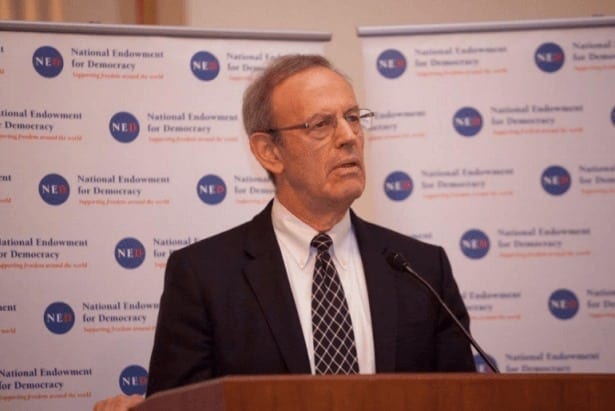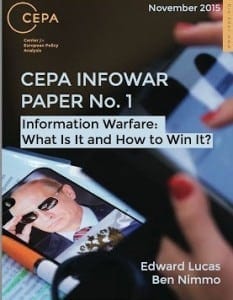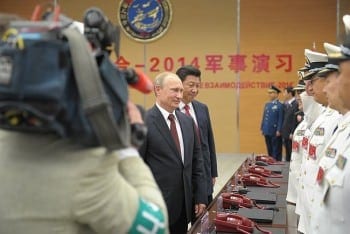![]()
SPOTTER: RICK STANGGENBORG
IMPERIALIST TOOL
Another cynical fig leaf for high crimes by the empire
Derek Royden, www.nationofchange.org

First iteration November 2nd, 2015
“A lot of what we do was done 25 years ago covertly by the CIA.”—Alan Weinstein, one of the founders of the National Endowment for Democracy
When we think about non governmental organizations we tend to focus on heroic groups like Doctors Without Borders, whose members travel into war zones treating the wounded without regard to the political affiliations of their patients. It’s dangerous work, as shown by a recent air-strike on a hospital run by the group in the Afghan city of Kunduz in which 13 staff and 10 patients died (7 other bodies have yet to be identified).
So, when we hear about Russia crafting a law in 2012 to make certain NGOs register as “foreign agents”, we naturally think this shows growing repression in that country. Offered as further proof of this is the fact that Putin’s government has created even stronger rules this year, seeking to ban “undesirable” groups. The first to be thrown out of the country in this way was the National Endowment for Democracy (NED). How could Russian law-makers ban an organization whose motto is: “Supporting freedom around the world’?
 Many notable people, including Carl Gershman, Chairman of the Endowment since its creation in 1983, have been vocal in criticizing this Russian legislation. They invariably fail to mention that the original 2012 law was based on a an American one enacted in 1938, the Foreign Agent Registration Act. This law, “also requires individuals and entities working for foreign interests and seeking to influence U.S. policies to disclose those relationships with the U.S. Justice Department or face prison.”
Many notable people, including Carl Gershman, Chairman of the Endowment since its creation in 1983, have been vocal in criticizing this Russian legislation. They invariably fail to mention that the original 2012 law was based on a an American one enacted in 1938, the Foreign Agent Registration Act. This law, “also requires individuals and entities working for foreign interests and seeking to influence U.S. policies to disclose those relationships with the U.S. Justice Department or face prison.”
Although it promotes itself as a “non-governmental organization”, NED receives at least 90% of its funding from the US Congress, earmarked to USAID; the balance is provided by right leaning non-profits like the Olin and Bradley Foundations. To most people, the Endowment probably looks like a pretty innocuous organization. After all, who’s against more democracy? But when you examine the records of those who control it and its affiliates, it starts to look like they’re running a shadow foreign policy, not only in Eurasia but throughout the world, sometimes acting in ways that are contrary to the wishes of the powers that be in Washington.

Carl Gershman (pictured, second from left) presents the 2011 Oxi Day Award to Jamel Bettaieb for his leadership in Tunisia’s Arab Spring. One wonders what actual services this individual lent NED to merit this prize. NED is a key player in the Anglo-Zionist empire’s propaganda wars.
To bolster its credibility as “non-partisan” in the American context, NED distributes more than half of its money to four organizations: the Free Trade Union Institute of the AFL-CIO (FTUI), the Center for International Private Enterprise of the U.S. Chamber of Commerce, the National Democratic Institute for International Affairs (NDI) and the International Republican Institute (IRI). Chairing the latter is Senator John McCain (R-AZ), probably the most well known hawk in the US Senate.
In fact, for an organization with the aim of “peaceful democracy promotion” it’s riddled with Neoconservatives and their Liberal Hawk counterparts, including such luminaries as Elliot Abrams (of Iran-Contra fame), Zalmay Khalilzad (Former Ambassador to Iraq and Afghanistan).and former Secretary of State Madeline Albright (Chairwoman of the NDI), to name just a few.
The presence of reliably pro-war Washington insiders like these points to the real roots of the organization during the Reagan Era when it was created with the input of then CIA Chief William Casey. At that time, the actions of the US intelligence community were being scrutinized in light of the Church Committee hearings and other revelations of the 1960s and 1970s. Thus, some of the functions that the CIA once performed were farmed out to the newly created Endowment. One has to concede that NED is a PR savvy version of what these agencies used to do covertly and it also helps to keep the hawks in the foreign policy conversation, whatever disasters they leave in their wake when they hold the reins of power.
Disturbing Patterns
[dropcap]L[/dropcap]ooking critically at the so-called “Color Revolutions” that NED has funded, one begins to see similarities that couldn’t be coincidental. One example is the symbol of a clenched fist, probably expropriated from the Black Panthers and first used by OTPOR, a Serbian youth group that became something of a template for successful regime change operations from the end of the 90s until today. Now called CANVAS (Center for Applied Nonviolent Action and Strategies), remnants of the group train civil society and student groups in many countries.
The fist symbol, originally black but often using the “colors” associated with each individual “movement”, has been seen with some variation in Georgia, Ukraine and Venezuela, places where NED or its affiliates spent big to produce regime change.
And it isn’t just student groups being trained and funded by the Endowment. As a 2013 report by Al Jazeera showed, in the weeks and months leading up to the ouster of Egyptian President Mohammed Morsi, NED and some of its affiliates were funding individuals and organizations calling for the overthrow of the elected government in the country.
The reporter on the story, Emad Mekay, made some interesting discoveries about the role that the organization played in the ouster of the Egypt’s first democratically elected president, including tracking down where some of the organization’s money was going: “A main conduit for channeling the State Department’s democracy [sic] funds to Egypt has been the National Endowment for Democracy. Federal documents show NED, which in 2011 was authorized an annual budget of $118m by Congress, funneled at least $120,000 over several years to an exiled Egyptian police officer who has for years incited violence in his native country.”
This charming man, Colonel Omar Afifi Soliman, the recipient of a “human rights fellowship” at NED, used social media to call for some pretty heinous things. One Facebook post, featured in the report, had Soliman calling on his Egyptian followers to “Make a road bump with a broken palm tree to stop the buses going into Cairo, and drench the road around it with gas and diesel. When the bus slows down for the bump, set it all ablaze so it will burn down with all the passengers inside… God bless.”
SIDEBAR
GET THE GOODS ON THIS IMPERIAL HENCHMAN HERE, AS REPORTED BY COLLEAGUES AT INFORMATIONCLEARINGHOUSE. click bar below
SHADY MOVES BY THE US TO PRECIPITATE REGIME CHANGE IN EGYPT
Exclusive: US Bankrolled Anti-Morsi Activists
END OF SIDEBAR
REGULAR ARTICLE RESUME HERE
[dropcap]A[/dropcap]lthough the press and politicians quickly forgot, it needs to be emphasized that Morsi was the elected leader of Egypt and, before he was ousted, he tried to negotiate an end to the crisis he helped to instigate, admitting that he “made many mistakes”. The word coup was rarely uttered in the aftermath of his removal and military aid to the tune of a billion and a half a year soon started flowing back into the country.
What’s going on in Egypt is an overlooked humanitarian disaster, it isn’t just members of the Muslim Brotherhood who are being rounded up by President al-Sisi’s thugs and given death sentences in mass trials. Many of the young people and progressive forces who so bravely faced off against Mubarak at Tahrir Square to create a more progressive Egypt are facing similar persecution. Ironically, some of them received aid from NED or affiliated groups and this could be used as evidence against them in court as Egypt has its own version of the “Foreign Agent Registration Act”discussed earlier.
A Danger to Democracy
[dropcap]T[/dropcap]here’s also the glaring hypocrisy revealed by where most of NED’s money gets spent. The cases of Haiti, Venezuela and most recently Honduras show that those governments deemed “Anti-American” (often a euphemism for not laying down for multi-national business interests) will be targeted for regime change regardless of their citizens’ democratic choices. It doesn’t matter how many elections deemed free and fair you win if you are seen as acting against American interests there is a good chance NED or one of its affiliates will put you in their cross-hairs.
It’s pretty obvious that foreign policy programs run by groups like NED risk de-legitimizing protest. If an increasing number of governments (or corporations for that matter) start engaging in these activities as we’re just beginning to see, paying protesters and the like, they could essentially professionalize protest, at the same time putting genuine aid workers at risk. As an interesting side-note, a convincing argument has been made that this kind of “Astro-turfing” helps explain the rise of the Tea Party movement in the US.
What’s most dangerous about NED is that it gives voice and a measure of power to some of America’s biggest hawks whether they’re in government or not. In this way and many others, NED is not only not promoting democracy, it’s often doing the exact opposite at US taxpayer expense.
—finis—
=APPENDIX=
Here’s an example of how the supremely hypocritical NED, a typical liberal artifact, does it job as an effective disinformation tool for the empire. Observe this attack on Russia, published on their website and presumably disseminated through their networks. Reproduced here in toto.—Eds.
Liberal democracies ill-equipped to deal with autocrats’ ‘hybrid warfare’

NED manual using Putin as “example” of autocracy. Naturally the American sheeple pay for these criminal entities and their shady business around the world.
The latest version of Russia’s National Security Strategy is the most specifically anti-Western one to date, Leonid Bershidsky writes for Bloomberg:
NATO and the European Union are accused of being unable to ensure the security of Europe, and the EU refugee crisis is held up as proof. The U.S. and EU, the document says, backed “an anti- constitutional coup” in Ukraine that “led to a deep split in Ukrainian society and an armed conflict.” The document argues that the West is out to topple “legitimate political regimes,” which creates instability and new hot spots.
The new strategy aims at protecting Russia’s “cultural sovereignty” by blocking external “destructive informational-psychologic influence,” notes Jamestown analyst Pavel K. Baev:
No useful tools exist yet for policing the Internet, however; and the vicious TV propaganda is becoming stale and tiresome (Meduza.io, December 24, 2015). As the chain of crisis situations increasingly becomes the new norm, Russians tend to lose interest in Syrian adventures or missile defences and start to ponder their deteriorating quality of life (Gazeta.ru, December 30, 2015). Revelations of hyper-corruption in the highest echelons of law enforcement, which a year ago made no impression, have again started to produce angry resonance in public opinion (Rbc.ru, December 24, 2015).
The strategy also again demonstrates that Moscow is conceptually ahead of the West in realizing that security and governance are essentially indistinguishable, notes Mark Galeotti, director of New York University’s Initiative for the Study of Emerging Threats:

The empire and its information whores are deeply concerned about the growing alliance between China and Russia and their insistence on independent action.
Russia’s new style of so-called “hybrid warfare” is in so many ways simply a logical reflection of that understanding, and suggests that — even if out of political constraints, economic shortage, inefficiency and downright stupidity in some cases — they may not be able to pull it off, they are also well aware that Russia needs also to be considering “hybrid defense.”
There are three takeaways for the West, Galeotti adds:
- First of all, do not get too worried about the strident new language; the tone reflects Russia’s new antagonisms with the West, but the underlying strategy is the same.
- Second, the Kremlin’s real security concerns are not so much military threats as political, economic, and technological challenges.
- Third, while the Russian economy may be in trouble and their geopolitical aspirations disproportionate to their actual capacities, the Russian state still has sharp strategic thinkers and their understanding of the modern “full spectrum” political-informational-economic battlespace is still unappreciated by their Western counterparts.
The U.S. government’s international media operations lack funding to counter the global blitz of state-sponsored propaganda from Russia, China and other rivals, says the head of the federal board that oversees Radio Free Europe/Radio Liberty and Voice of America.
“There’s no question we’re badly underfunded and don’t have enough money to compete with our adversaries,” Jeff Shell, chairman of the Broadcasting Board of Governors, told The Washington Times.
“We have three great challenges right now,” he said. “The challenge of this newly nationalistic Russian media, the challenge of China presented increasingly through cybertechnology and, finally, the challenge of violent Islamic extremists spreading their propaganda online.”
“We should be marshaling our resources,” he said.
2015 has seen the flourishing of conflicts that exist in a gray zone, one which is not quite open war but more than regular competition, which is attuned to globalization, which liberal democracies are ill-equipped to deal with, and which may well be the way power is exercised and conflict conducted in the foreseeable future, analyst Peter Pomerantsev writes for The Atlantic:
In the case of Russia’s ongoing campaign in Ukraine, for example, hyper-intense Russian propaganda has cultivated unrest inside the country by sowing enmity among segments of Ukrainian society and confusing the West with waves of disinformation, while Russian proxy forces and covert troops launch just enough military offensives to ensure that the Ukrainian government looks weak. The point is not to occupy territory—Russia could easily annex rebel-held eastern Ukraine—but to destabilize Ukraine psychologically and advance a narrative of the country as a “failed state,” thus destroying the will and support inside Ukraine and internationally for reforms that would make Kiev more independent from Moscow and might, in the longer term, create hope for democratic reform inside Russia.
China on Monday hailed Russia’s updated security strategy which names the United States as one of the threats to Russia’s national security for the first time, and also lists threats from NATO and “color revolutions”, the BRICS Post reports:
The document describes those involved in “colour revolution” as “radical social groups which use nationalist and religious extremist ideologies, foreign and international NGOs, and also private citizens” who work to undermine Russia’s territorial integrity and destabilize political processes.
The document says that the United States and the EU have supported an “anti-constitutional coup d’etat in Ukraine”. China, has also, in the past, warned against attempts to destabilize the country through “colour revolutions”.
“I want to make it clear that China categorically opposes the sanctions the United States and Western countries have taken against Russia. China categorically opposes colour revolutions and attempts to hold back Russia’s development,” said Chinese Vice Premier Zhang Gaoli in September in Moscow.
China’s doctrine of the Three Warfares stretches non-physical aspects of hybrid warfare even further, Pomerantsev adds…
….using “legal,” “psychological,” and “media” warfare to, in the words of the analyst Laura Jackson, who directed a Cambridge University and U.S. Defense Department research project on the subject, “undermine international institutions, change borders, and subvert global media, all without firing a shot. The Western, and especially American, concept of war emphasises the kinetic and the tangible—infrastructure, arms, and personnel—whereas China is asking fundamental questions: ‘What is war?’ And, in today’s world: ‘Is winning without fighting possible?’”
However, though Moscow’s ties with Beijing have never been better, they have never been very good, Hudson Institute analyst Richard Weitz writes for The Diplomat:
The bilateral relationship is still mostly marked by harmonious rhetoric but few specific projects outside of Central Asia, arms sales, and intermittent energy deals marked by protracted negotiations over pricing and other disputes. Chinese entrepreneurs have been as wary as others about investing in Russia, with China’s FDI flowing overwhelmingly into other Asian countries as well as the EU and the United States. Despite Moscow’s outreach to Beijing, there is no indication that China has made any effort to use its much greater leverage with ASEAN to assist Russia’s integration efforts.
Note to Commenters
Due to severe hacking attacks in the recent past that brought our site down for up to 11 days with considerable loss of circulation, we exercise extreme caution in the comments we publish, as the comment box has been one of the main arteries to inject malicious code. Because of that comments may not appear immediately, but rest assured that if you are a legitimate commenter your opinion will be published within 24 hours. If your comment fails to appear, and you wish to reach us directly, send us a mail at: editor@greanvillepost.com
We apologize for this inconvenience.
Nauseated by the
vile corporate media?
Had enough of their lies, escapism,
omissions and relentless manipulation?
Send a donation to
The Greanville Post–or
But be sure to support YOUR media.
If you don’t, who will?



